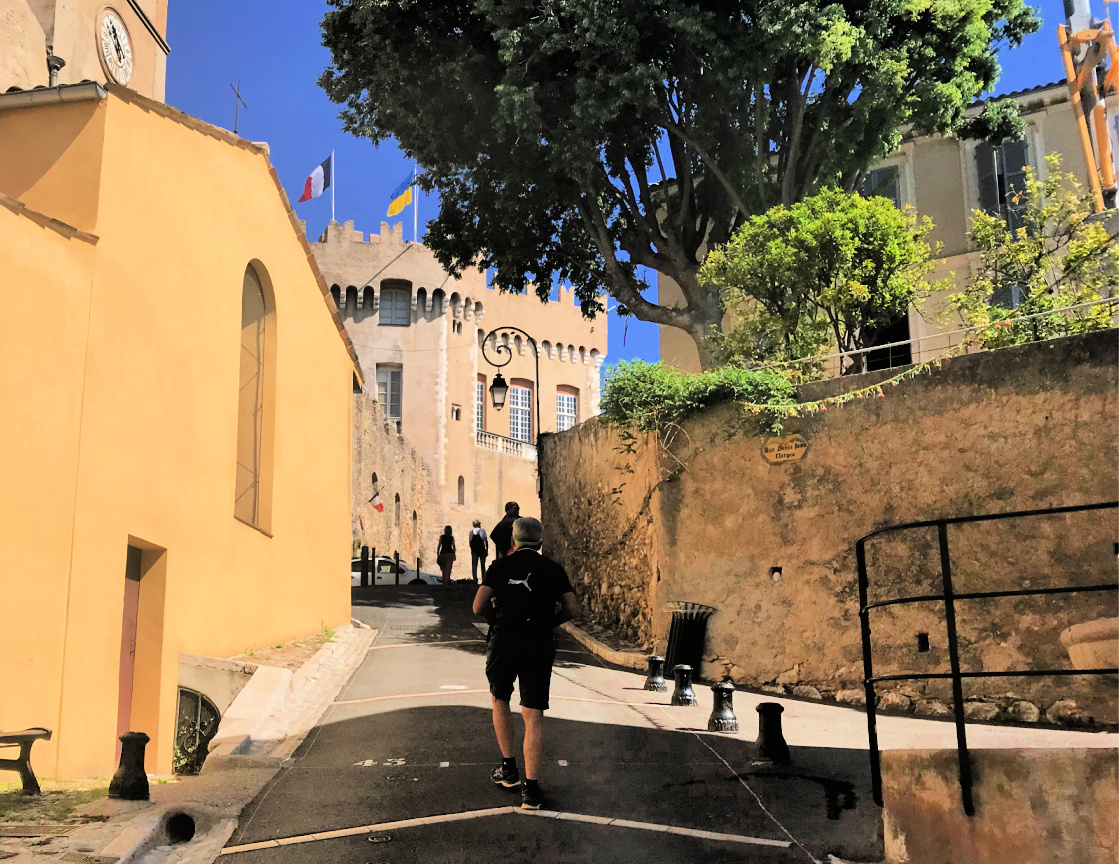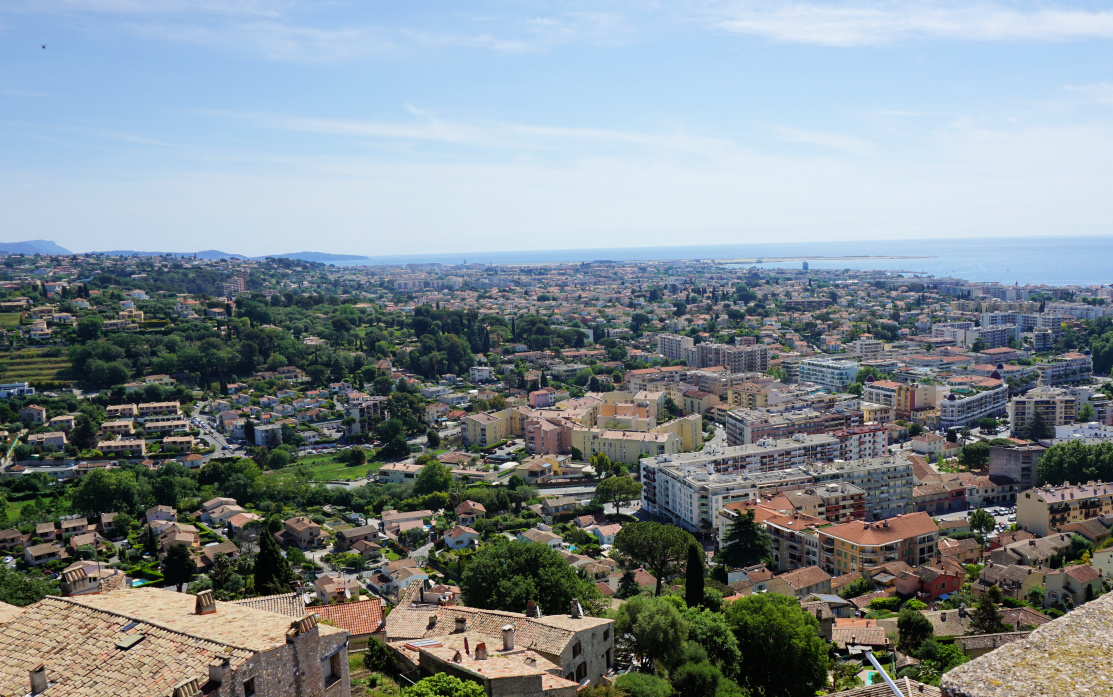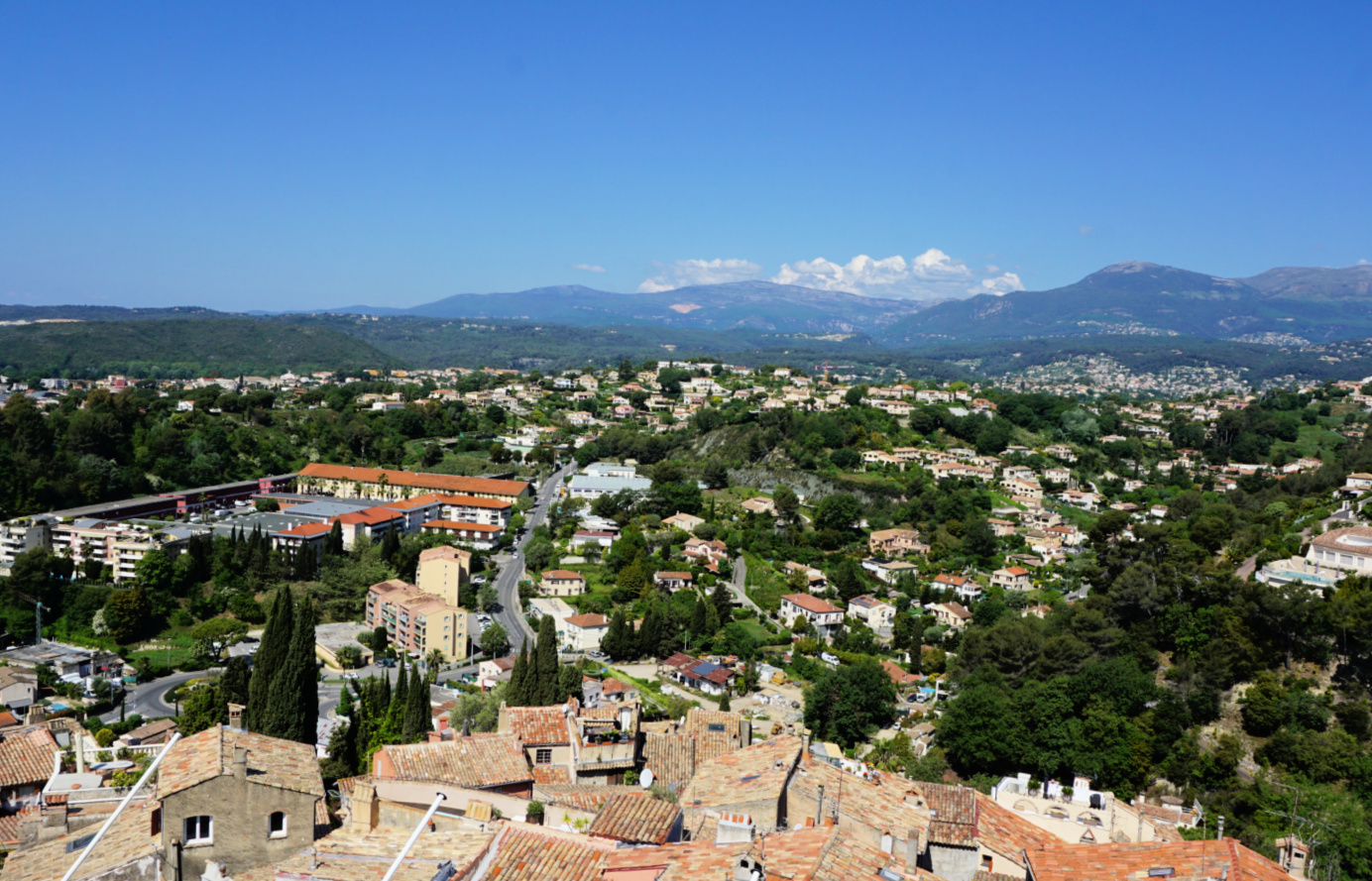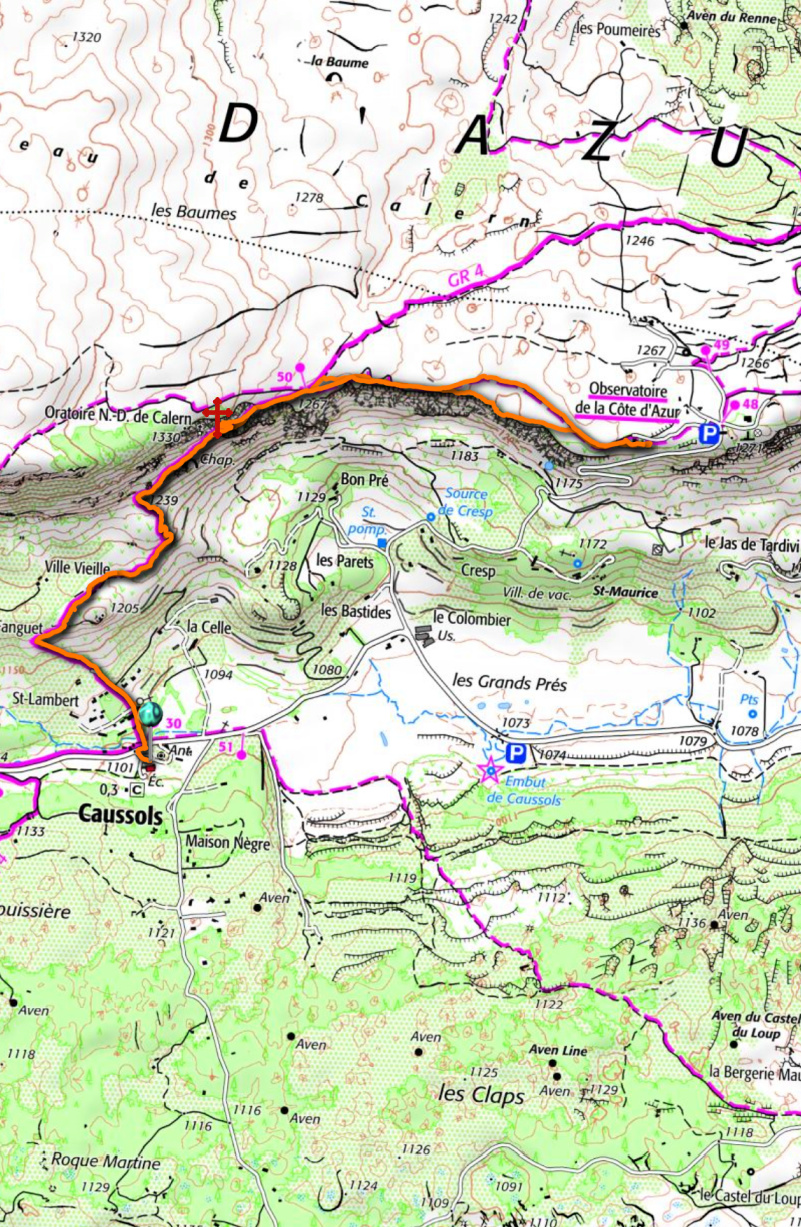The following loop hike is just an extension of the popular Pié Martin circuit above Tourrettes-sur-Loup (400 m).
 |
| Tourrettes-sur-Loup |
 |
| Alley in Tourrettes-sur-Loup |
 |
| Stonebridge over Vallon du Cassan |
 |
| Main road through village |
Starting from the village, we passed the Chapelle Saint-Jean by the homonymous road, then continued along Route des Queinières and Chemin Saint-Martin, all paved (Signposts #160, 161, 180, 181 and 183). At signpost #183 (1,6 km from the village square) we continued along a good trail to signpost #184/184bis and an intersection where we forked left towards Domaine de Courmettes. This is where we on our previous hikes took the right-hand path.
 |
| Trail after signpost183 |
 |
Domaine des Courmettes info
|
 |
| Bar sur Loup seen from trail |
 |
| Trail between #184 and #187 |
 |
| Tourrettes-sur-Loup seen from trail |
It turned out to be a good wide path with nice views down to the Loup River Valley in places. We reached the dirt track leading to the Domaine. We forked right (signpost #187), and headed along it northeast, passing the trail up to Pic de Courmettes. Descending gradually, we reached signpost #186 after about 1,1 km, forked right and descended to Pié Martin and further back to the Saint-Martin neighbourhood, closing the loop.
Climb: 490 m
Distance: 9,8 km (start from the main parking)
Duration: 3h 10
Map: “Cannes-Grasse” 3643ET
The following simple but tasty recipe is inspired by a TV show on the French morning TV, Télématin. Their TV journalist visited the Negresco Hotel in Nice where the cheffe Virginie Basselot cooked her recipe. Since 2018, Virginie Basselot has been at the helm of the Negresco’s restaurants.
My recipe is a twist of Virginie Basselot’s more refined recipe which she said was made for tout le monde, everybody.
2 servings
Whole wheat pasta such as fusilli, penne, farfalle
½ potimarron
Olive oil
For the mousse:
1 small shallot, minced
1 clove garlic, minced
1 tbsp. olive oil
150 ml white wine
A generous handful of grated pecorino
3 tbsp. crème fraiche, 15 % fat
Freshly ground black pepper
Fresh herbs to decorate
Preheat the oven to 200° C roast.
Clean and slice the potimarron half. Place the slices in an oiled oven-proof dish and brush with olive oil. Roast for 25- 35 minutes until soft. Remove from the oven and cut away the skin. Set aside until needed.
Meanwhile cook the pasta as advised on the package.
For the mousse, sauté the shallot and garlic for about 10 minutes over medium-low heat. Add the white wine and increase the heat to medium-high. Cook until the wine has reduced by about a third. Whisk in the pecorino, crème fraiche, and some black pepper.
Drain the pasta and divide on the plates. Dot with the pecorino mousse and divide the potimarron slices on top. Decorate with some chopped fresh herbs.
We wanted to explore a direct trail from Saint-Jeannet up to Baou de la Gaude (796 m) which is the easternmost baou looming above the village.
We had observed a path on the southwestern flank of Baou de la Gaude which was not marked in any of our maps nor in any guides.
 |
| Spring flowers |
 |
| Village of Saint-Jeannet |
 |
| Baou de la Gaude |
 |
| Start of trail |
 |
| First part of trail |
From the parking at the entrance of the village, we followed the GR51 about 250 m, heading east along Promenade de Saint-Pétronille. We forked left to Chemin de Lucioles, and climbed along the narrow paved street about 300 m until we reached a narrow path on our right-hand side. There were green marks painted on rocks. We headed north, then northeast while the incline became steeper and steeper. To proceed, it became necessary to use your hands in many places. Nearing the summit, we temporarily lost the green markings. We continued straight up, found the markings again and the trail suddenly emerged to the summit. Using this path requires a good physical form, agility, and surefootedness.
 |
| Getting steeper |
 |
| Scramble needed |
 |
| Narrow part of trail |
 |
| On western flank of Baou de la Gaude |
 |
| View to west from Baou de la Gaude |
 |
| Famous old oak tree |
From the southern cliff of Baou de la Gaude we had super views down to Saint-Jeannet, the neighbouring baous, the Var River Valley and the coastline. After a well-deserved break, we headed north, now along well used trails, passing the famous old oak-tree and La Colle 844 m), the highest point of today’s hike. We reached signpost #75, then descended to signpost #76.
We forked left, heading south in Vallon de Parriau, descending to signpost #95 where we merged with the GR51 trail, and followed it back to Saint-Jeannet.
Distance: 7,1 km
Climb: 430 m
Duration: 2h 40
The sweetness of oranges and dried cranberries makes this winter vegetable side ideal for duck breast, magret. It will also go nicely with pork chops or turkey escalopes.
This vegetable dish is at its best in winter when the oranges from Southern Europe are in season.
2 servings
About ¼ of a red cabbage head
1 orange
2 tbsp. dried cranberries
A small handful of walnuts
2 tbsp. olive oil
Freshly ground black pepper
Fresh herbs to decorate
Warm the olive oil over medium-low heat in a heavy cocotte, cast iron casserole. Finely slice the red cabbage and sauté covered in the casserole for about 20- 30 minutes together with the cranberries.
Peel the orange and cut into smallish chunks. Add to the casserole. Coarsely crush the walnuts and add to the casserole. Grind over some black pepper. Cover and continue cooking for about 5 minutes.
Serve with duck breast or other meat and decorate with some fresh herbs.
 |
| Chateau Grimaldi |
Haut-de-Cagnes is a medieval Riviera hilltop village famous for its artistic past. The village is well visible from the coast. The Grimaldi Castle, Château Grimaldi dominates the old town with its tower over 90 m asl.
We visited Haut-de-Cagnes on Victory Day when both the Château Musée Grimaldi and restaurants on the Place du Château were open. We parked in the centre of Cagnes-sur-Mer and walked through the town, first following traffic signs to Haut-de-Cagnes then ascended along a pedestrian itinerary. It was less than half an hour’s walk to the Place du Château.
 |
| Haut de Cagnes pedestrian route |
 |
| Stairs to Haut-de-Cagnes |
 |
| Near Chateau Grimaldi |
 |
| Chateau Grimaldi ceiling |
 |
Chateau Grimaldi inner court
|
We first visited the Château Musée Grimaldi which exhibits lesser-known artists. There is also a room dedicated to Suzy Solidor showing her portraits by various artists. She was a cabaret star/singer/actress whose career in Paris and on the Riviera continued half a century from the 1920s.
The castle itself is well preserved with a remarkable painted ceiling. From the tower, the 360° view is super.
 |
| View to east from castle tower |
 |
| View to southwest from castle tower |
 |
| View to northwest from castle tower |
 |
Suzy Solidor portraits
|
According to a recent article in Nice Matin, there are still about twenty artists actively working in the village. They complained that the village lacks visitors because the access is difficult. Well, it’s a short walk from the town centre but involves climbing! There’s a free electric shuttle bus as well.
Haut-de-Cagnes is indeed very quiet compared with St-Paul-de-Vence which draws crowds. But St-Paul also has several art galleries and shops which are open every day whereas the artists in Haut-de-Cagnes only have open doors every first Sunday of the month.
Before walking back, we had a nice relaxing lunch in one of the restaurants on the Place du Château.
Distance: 3,4 km including the museum
Climb: 110 m including the castle tower
Duration: Less than 1 h from Parking de la Villette to the Place du Château and back
 |
| Haut-de-Cagnes walk track |
It is always a good idea to have cooked white beans in your freezer. I always cook a large amount of white beans, just remember to soak them overnight, and freeze them in batches. These can then easily be incorporated in various stews or soups. They can also be puréed and used as a dip or a part of a salad.
2 servings for a lacto-vegetarian salad
2 handfuls of cooked defrosted white beans
50 ml tasty olive oil
Juice and zest of ½ organic lemon
A pinch of salt (optional)
Freshly ground black pepper
A handful of chopped fresh organic herbs such as basil, chives, parsley, mint etc.
Place all the ingredients in a deep bowl and purée with a handheld mixer into a nice consistence. If needed, add 1-2 tbsp. of water.
Divide the purée in the middle of the plates. Surround with baby salad leaves and parmesan shavings. Sprinkle over olive oil vinaigrette. Serve with some good whole wheat or rye bread for a carefree and super healthy lunch.
Collet de Maçon, our planned goal today, was covered with snow and we decided
instead to hike along the GR4 towards the
Côte d’Azur Observatory situated on the vast Calern Plateau. The
southern flank of
Sommet de Calern
offered a certain microclimate on the sunny winter day, just a few days after
a heavy snowfall.

|
| Caussols Church |

|
| GR4 to Calern |

|
|
Caussols Plateau seen from Calern
|

|
| Colle du Maçon |

|
|
Limestone formations Calern
|
From the Caussols Mairie parking, we crossed the D12 road (signpost
#30) and followed the GR4. There was still a few patches of snow on the
trail. Higher up, we passed the now familiar limestone formations. We
reached signpost #50 on the plateau, and left the GR4. There were several
paths leading to the observatory. We hiked along a trail near the precipice.
The views were spectacular as far as to Mont Mounier in the north.

|
|
Haut Montet viewed from Calern
|

|
|
Mont Mounier seen from Calern
|

|
|
Montagne de Thiey & Sommet de Calern
|

|
|
Cheiron Massif seen from Calern
|

|
|
Cave entrance Calern
|

|
|
Notre Dame de Calern chapel
|
After our picnic, we returned to signpost #50 and continued along the GR4
about 300 m until we saw an unmarked trail up to
Notre dame de Calern, a small chapel built inside a cave. From the
cave entrance, a 10 m long tunnel led to the chapel which was behind a
closed gate. A beautiful shrine!
We descended to the main trail and headed back to our starting point.
Climb: 250 m
Distance: 7.2 km
Duration: 2h 30
Map: 3543 ET Haute Siagne
Chermoula is a Moroccan sauce and marinade usually served with fish or vegetables and chicken. Chermoula was traditionally prepared in a mortar with a pestle to crush all the herbs so that they best released their flavour. Because I am not a fan of fresh coriander I have only used parsley for my chermoula.
2 servings
6 sardine fillets
3-5 new potatoes
2 medium onions
8 black olives, pitted
1 lemon
Olive oil
Freshly ground black pepper
A few sprigs of parsley to decorate
For the chermoula:
4 tbsp. finely cut parsley
1 clove of garlic, minced
2 tsp. paprika powder
2 tsp. cumin powder
2 tbsp. lemon juice
3 tbsp. olive oil
A pinch of salt
Freshly ground black pepper
Preheat the oven to 200° C.
Prepare the chermoula. Crush the minced garlic, a pinch of salt, black pepper, paprika powder, and cumin powder in a mortar with a pestle. Add the parsley, cut finely with scissors, and the olive oil. Juice the lemon and use 2 tbsp. for the chermoula saving the rest for the potato bake. Crush all the ingredients in the mortar into a nice consistence.
Place the sardine fillets on a large plate skin- side up and spread half of the chermoula on them. Cover with foil and keep refrigerated until needed.
Wash and peel the potatoes. Cut into thin slices. Peel the onions and thinly slice them. In a bowl, mix the potato and onion slices with 2 tbsp. olive oil, the rest of the lemon juice, and freshly ground black pepper. Pour into a non-stick oven-proof dish and bake for 30 minutes. Then add the rest of the chermoula and the olives and mix. Continue baking for 30 minutes, covering the dish if needed, or until the potatoes are soft.
Place the sardine fillets on top of the potato- onion bake and return the dish into the oven for 10 minutes. Decorate with a few sprigs of parsley and serve with some wilted spinach or other greens.
































































